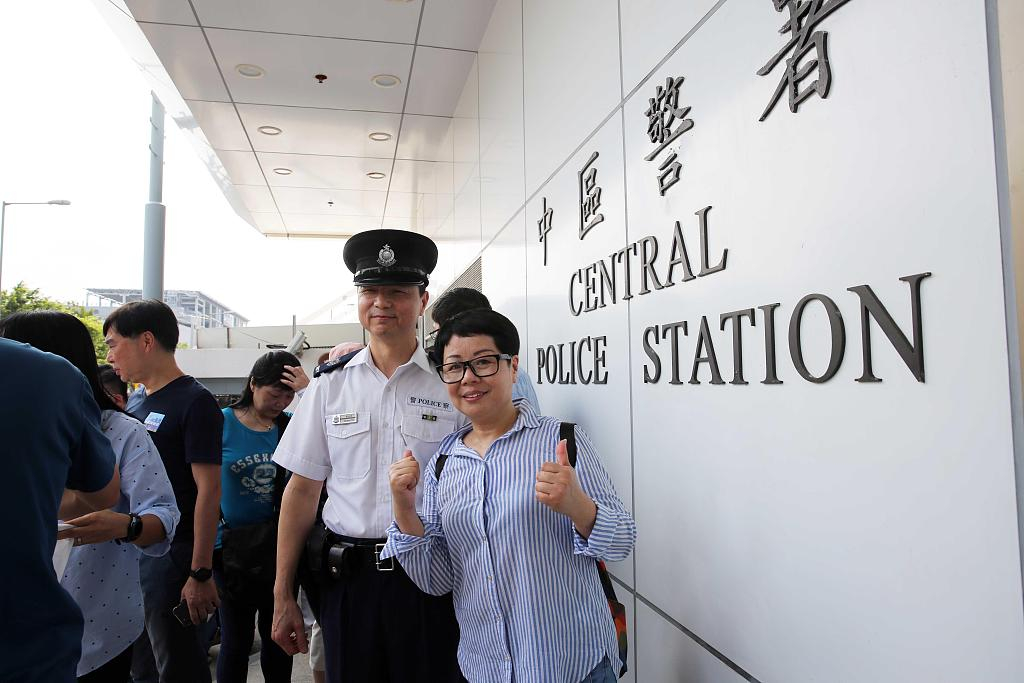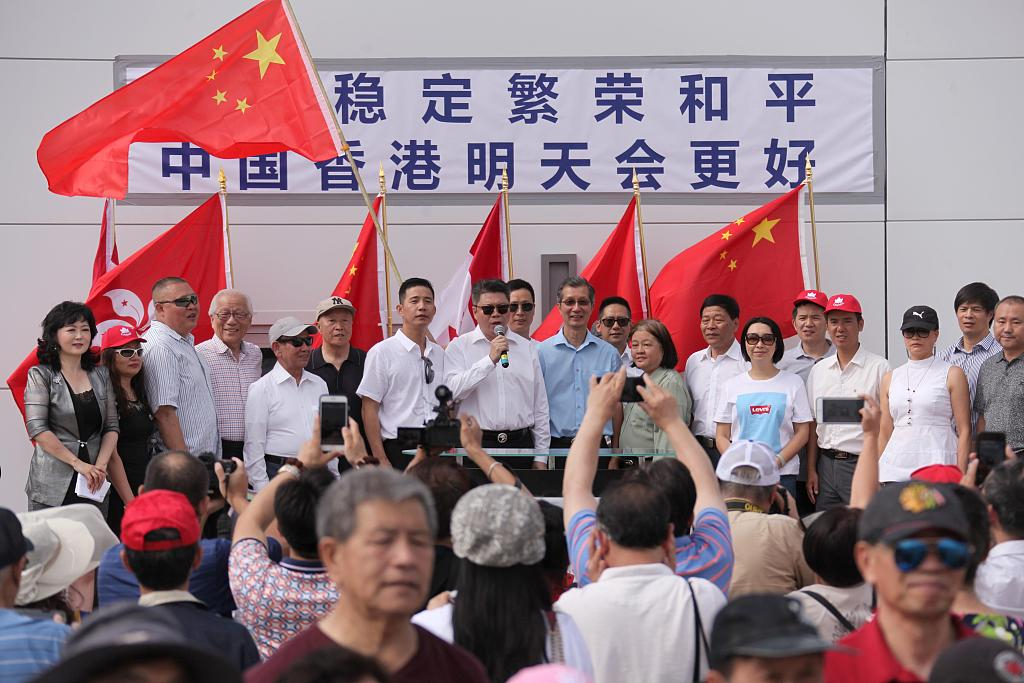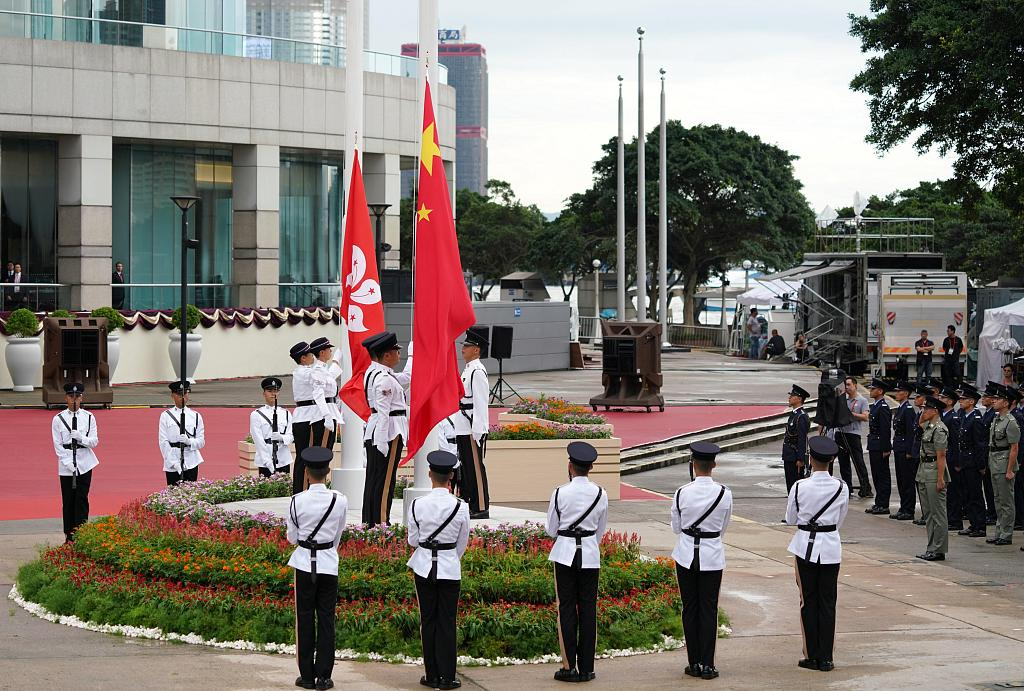
It's been over a month since Chief Executive of the Hong Kong Special Administrative Region (HKSAR), Carrie Lam, announced on July 9 that a proposed fugitive bill is "dead" in response to mixed reactions from local residents. However, the protests that the now-defunct amendments triggered show no sign of abating, plunging the region into turmoil amid growing suspicions about the motives of those on the street.
Radical protesters have broken into the Legislative Council complex, defaced the national emblem, thrown the national flag into the sea and assaulted police officers, civilians and journalists.
"The nature of protests has changed since the 2014 illegal 'Occupy Central' movement," Hazel Liu told CGTN Digital, who's from independent media based in Hong Kong.
At the time, protesters would unfurl banners and shout slogans during sit-ins, and pose for cameras in front of journalists before they begin their march. Now, they damage public property, hurl bricks, throw petrol bombs and direct laser pointers at law enforcers. In one instance, one demonstrator bit off a police officer's finger.
Most recently, all flights in and out of the HKSAR were cancelled due to chaos caused by a protest in Hong Kong International Airport. A day after, a mob of protesters tied up a journalist from the Chinese mainland at the airport and threw punches and water bottles at him.
Hong Kong, once one of the safest cities in the world, has fallen on hard times. Some are saying the chaos gripping the city is calculated, and with protesters' targets becoming clear, observers believe that the movement smacks of foreign interference and that the "invisible hands" pulling the strings are now self-evident.
The ceiling of protesters' demands is getting higher, well beyond the reality of Hong Kong as a special administrative region, said Zhao Ke to CGTN Digital, a professor at the Party School of the Communist Party of China (CPC) Central Committee.
What the demonstrators are calling for seems to be time-dependent, changing as days go by.
What do protesters want?

Hong Kong residents gather to support the police, August 10, 2019. /VCG Photo
One protester, who only gave his surname Lin, told CGTN Digital through an intermediary that he joined demonstrators in at least five occasions, including a massive march on June 9. Organizers placed the number at around one million, while police said 240,000 people took to the streets on that day.
Judged by his careful wording, Lin is not satisfied with Hong Kong chief executive's July 9 announcement that "the bill is dead." He insisted that it be withdrawn.
The bill's withdrawal is one of five demands that protesters have put forward. The list also includes taking back the riot characterization of protests, releasing protesters arrested by police, looking into alleged misconduct by law enforcers and holding elections by universal suffrage.
Shouting for democracy, acting against it
Calls for dropping charges against the arrested protesters at the present stage are against the rule of law, insists Wu Yingpeng, a Hong Kong-based barrister, citing Article 25 of the Basic Law. "All Hong Kong residents shall be equal before the law."
"Every Hong Kong resident is bound by the law. Those who have violated the law must pay the price with no exceptions especially in the case of violent crimes," Wu explained to CGTN Digital.
Based on Article 63 of the Basic Law, the Department of Justice of the HKSAR is tasked with controlling criminal prosecutions, free from any interference. "Even the chief executive shall not interfere," Wu stressed.
The Hong Kong police say those taken into custody were caught on charges of disrupting public order and attacking officers.
Police powers are restricted as the law in Hong Kong strictly protects the individual rights, including rights of protesters, Wu explained.
"Police officers must strictly abide by the law, with their acts monitored by media as well. In recent rallies, there have been difficulties for the police to differentiate peaceful demonstrators and radical ones considering they are all clad in black," Wu noted.
"It seems that radical protesters have found an excuse. Violence should be severely restricted, unless for law enforcement or self-defense. The precondition for pursuing democracy is to adhere to the rule of law. Otherwise, it's against democracy," he stressed.

Overseas Chinese in Toronto, Canada, participating in an assembly to support the "One Country, Two Systems" principle, August 11, 2019. /VCG Photo
'One Country, Two Systems' principle under attack
Violent protesters' acts against the symbols of Chinese sovereignty have been documented in recent assemblies.
China's national emblem, which adorns the front of the Liaison Office, was defaced with paint, and the national flag was removed from a flagpole and tossed into the sea.
"Those radical protesters were offending the sovereignty of the PRC and have trampled on the 'One Country, Two Systems' principle, which is the bottom line," Zhao Ke told CGTN Digital.
"A high degree of autonomy isn't equal to complete autonomy. The HKSAR power is granted by the central government, which is also authorized to supervise how autonomy is practiced," explained Zhao.
Trouble unepected and expected
While the fugitive bill triggered the current tumultuous situation, experts believe it's a manifestation of pent-up anger and growing disillusionment with the state of affairs in Hong Kong.
"The protests since June are a reflection of social contradictions, especially since the 2014 illegal 'Occupy Central' movement," Hazel Liu said.
Hidden under the glossy facade of the city, is a bleak reality.
Hong Kong is among the world's most expensive cities, sharing the title with Paris and Singapore, according to the Economist Intelligence Unit's 2019 Worldwide Cost of Living Survey.
Its GDP growth in the first quarter of the year was anemic at just 0.5 percent, the weakest increase since 2009. Thirty-five percent of Hong Kong's economy goes to a combined net worth of its top 10 billionaires, according to a 2016 Bloomberg report. And as of 2017, Hong Kong's Gini coefficient was 0.539, the highest since the gauge of income inequality was introduced over 40 years ago.
No place like home?

A flag-raising ceremony is held to mark Hong Kong's 1997 return to China, July 1, 2019. /VCG Photo
Housing remains a headache for Hong Kong residents, policymakers and successive chief executives as locals endure exorbitant rents to secure – and even share – a roof over their heads.
In his last policy address in January 2017 before leaving office, former chief executive Leung Chun-ying singled out high property prices as a cause for concern.
The city once had an ambitious housing policy. It was introduced by then Hong Kong chief Tung Chee-hwa in October 1997, the same year Hong Kong returned to China, and envisioned 85,000 new units of flats for public rental and private ownership every year.
No housing crisis would have occurred if the goal of the "85,000-unit policy" had been stuck to, said Leung in June 2018.
If the undercurrent of tension hanging over Hong Kong is because of its unaffordable property market and other woes helped spark the recent demonstrations over the fugitive bill, the media has surely fanned the flames.
Media manipulation
Up until recently, the term "反送中" was alien to people in Hong Kong. It translates to "Against sending [people] to the Chinese mainland" and was used to reject the bill that was being debated by lawmakers in Hong Kong at the time.
By not mentioning who in Hong Kong would be subject to deportation, the phrase created confusion and alarm among people.
"My curiosity was aroused when I heard the term for the first time," said Hazel Liu. "Who would be sent?" she asked herself.
The vague term was coined by Apple Daily, a Hong Kong newspaper aligned with the opposition "pro-democracy movement," in its coverage of the bill. The obscurity of the term was part of a misinformation campaign against the revisions as they were framed as arbitrary amendments that took a bite out of the region's autonomy.
"Some media played a 'proactive' role [in stoking fear]," said Hazel Liu, pointing to a "tactic" by Apple Action News, a video news service affiliated to Apply Daily, to stealthily manipulate the public.
Apple Action News launched a user registration system on April 10, providing members with access to a wide range of content for free.
Within six days, more than 2.1 million people had signed up, according to the website's figures. By late May, the figure rose to over 3.17 million by some estimates. That's almost half of Hong Kong's population (7.41 million by the end of 2017).
"User registration could be an excuse. What Apple Daily has done is an effective survey, designed to know in advance the number of Hong Kong residents it can possibly use," analyzed Hazel Liu.
The news site is owned by Jimmy Lai Chee-ying, a wealthy entrepreneur who's been accused of financing the ongoing protests. The controversial figure has drawn criticism from locals who called him "an obedient lackey of the U.S."
Orchestrated chaos
The mutation of demonstrations into chaotic scenes of clashes and commotion is not a coincidence and has long-term goals beyond shooting down the now-defunct bill, experts note.
"The radical protesters have a three-step plan, which is clear and well-designed," wrote Xiake Island, a commentator on a WeChat platform affiliated with People's Daily.
First, they push the HKSAR government to drop the riot characterization of protests and release arrested protesters. Next, they tarnish the image and reputation of the HKSAR government, which would then struggle to get more votes at the ballot box – radicals' third goal.
The 2019 District Council elections are scheduled for November and the Legislative Council election for September 2020.
Political anarchism and dissolution of the "One Country, Two Systems" principle are what rioters are daydreaming about, the analyst suggested – and some say there is mounting evidence that they're receiving help from the outside.
"The violent incidents recently are somehow the work of the U.S.," said China's Foreign Ministry spokesperson Hua Chunying on July 30, in response to remarks by U.S. Secretary of State Mike Pompeo defending the protests in Hong Kong.
"External forces must be interfering and it is the U.S. and China's Taiwan, based on various signs," said former chief executive Tung Chee-hwa on July 31.
Taiwan has become a "sanctuary" for rioters, whom authorities call "friends from Hong Kong," wrote Wen Wei Po, a Hong Kong-based newspaper, on August 1.
More than 30 radical protesters have fled to Taiwan, including Joe Yeung Yat-long, a Hong Kong secessionist and stubborn believer in violence as a form of protest. On June 26, he jointly spearheaded the siege of a Hong Kong police station with another radical protester.
The rioters are using Taiwan as a pit stop en route to the U.S., waiting for the approval of Hong Kong Human Rights and Democracy Act by the U.S. Congress, wrote Wen Wei Po.
Once greenlit, it would be convenient for rioters to move to the U.S. They will leave Hong Kong behind, in chaos.

Copyright © 2018 CGTN. Beijing ICP prepared NO.16065310-3
Copyright © 2018 CGTN. Beijing ICP prepared NO.16065310-3